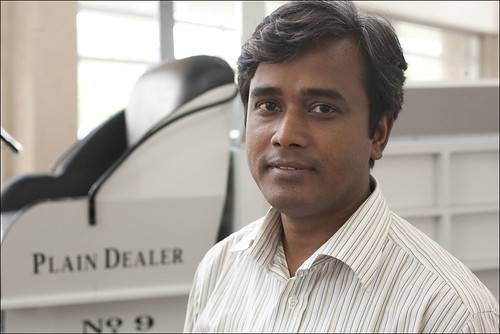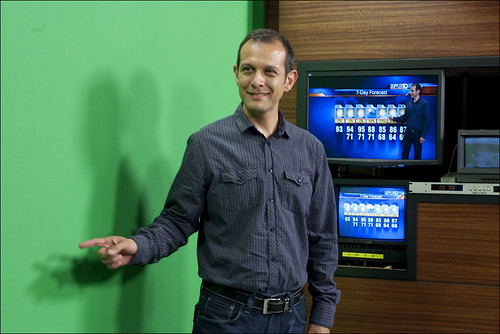As the 2010 SUSI program winds down to a close, we wanted to catch up with some of the SUSI scholars and see what they have done in the past 11 months.
Dr. Amani Alhalwachi, University of Bahrain, Bahrain
Dr. Alhalwachi has been busy since she returned to Bahrain last summer. Besides having a child in the last year, she has redesigned the course plan for computer assisted reporting at her university, the University of Bahrain. To redesign the course plan, she used much of what she learned during her six weeks in the U.S. to set new learning outcomes, formulate a new structure for assignments, and to get input from Investigative Reporters and Editors (IRE).
Next year, she plans to implement American media theories and techniques and different aspects of American journalism into her academic research about “audience participation with media application on iPhone mobile.”
Dr. Alhalwachi continues to keep in touch with her SUSI colleagues, and the University of Bahrain publishes updates about her participation in the SUSI program.
“The SUSI Program was one of the best experiences that I’ve ever had in my life,” Dr. Alhalwachi said.
Ms. Outi Hakola, University of Helsinki, Finland
During the past year, Ms. Hakola has taught multiple courses, earned a degree, attended three conferences, published articles, and was nationally recognized for her research.
In the past academic year, she taught four courses, two of which focused on American media (journalism, film and television production). She said the SUSI program helped her to update her teaching material and reading lists.
Ms. Hakola graduated as a doctor of philosophy, with a dissertation entitled, “Rhetoric of Death and Generic Addressing of Viewers in American Living Dead Films,” which she is currently turning into a book for an international publisher. After finishing her degree, she received media attention from major newspapers, radio shows, book fairs, and national television networks.
Ms. Hakola has published articles on contemporary audiovisual vampires, vampires as heroes, trends in U.S. media, and death events and the public sphere.
“I have started at a new job at the Helsinki Collegium for Advanced Studies (University of Helsinki, Finland) where I am attending to an interdisciplinary research project on Human Mortality,” Ms. Hakola said. “Currently I’m working with a project on Human Mortality where I am studying death in media and especially in popular media, such as popular films and television series.”
Since the beginning of the year, she has been the chair of the Finnish Society for Cinema Studies, joined the editorial board of Media & Communications (Media & Viestintä) journal, and has continued working at the task group of International Institute for Popular Culture, the Lähikuva journal, and as an editor-in-chief in Wider Screen journal.
Mohammad Abualrob, Birzeit University, Palestine
Mr. Abualrob said he learned many different aspects of American media during the SUSI program, particularly about the role of social media networking and the media application of Facebook and Twitter. Because he has a specialization in media theories, he said he learned the most from Dr. Yusuf Kalyango’s theory sessions last summer.
Upon leaving the United States, after the six-week SUSI program, Mr. Abualrob attended a media conference in Palestine, where he presented a paper about Palestinian satellite channels, the Palestine internal conflict between the Fateh Party and the Hamas, and how each party uses the media to attack the other.
While continuing to prepare his Ph.D, he received a promotion at Birzeit University in Palestine. He also developed a media course, using information he learned from the SUSI program, known as computer for mass communications, and he taught part-time at the Arab American University in the West Bank.
Finally, he attended two conferences. At the second conference about “misusing media in conflict regions” at Turku University in Finland, Mr. Abualrob presented a paper about social media in the context of the Israeli-Palestinian conflict and “the trick of free channels, free borders.”
Mr. Abualrob said he stays in touch with the media scholars and friends he made while participating in the SUSI program last summer.
Mofizur Rhaman, University of Dhaka, Bangladesh
Since returning from his time in the United States, Mr. Rhaman has been using books bought in Ohio to teach courses such as Concepts of Journalism and Communication Theory. He has implemented American media ideas into the classroom, as well as his experiences visiting American media institutions during the SUSI program.
Throughout the last year, Mr. Rhaman spent seven weeks working on independent research with faculty of the Department of Journalism at Oslo University. He also traveled to Bergen, Norway in November to attend a lecture on Media, Climate Change and Politics and a seminar organized by the Media Climate Network.
Mr. Rhaman submitted a book chapter to be published by NORDICOM, and he is currently working with Climate Crossroads Projects in conjunction with Bergen University in Norway. He received media coverage when Norwegian radio, NRK, interviewed him in May. He also made several appearances on a Bangladesh television talk show to analyze reports and newspapers.
In the future, Mr. Rhaman plans to submit work to the AEJMC and ICA conferences, and he would also like to begin working on his doctorate degree.
Dr. Manuel Ayala, Instituto Tecnológico y de Estudios Superiores de Monterrey (ITESM), Mexico
After finishing his time in the United States last summer, Dr. Ayala made changes to the course he teaches, continued his research, and helped the International Communication Association (ICA).
Dr. Ayala said he implemented many aspects of American journalism, which he learned during the six-week SUSI program, into his Communication Research Seminar. He applied theories and concepts such as, media clusters, social media, ethics, and development communication.
With the help of Dr. Anne Cooper-Chen, Scripps professor and SUSI research coordinator, Dr. Ayala is continuing his research of the representation of crime as portrayed by American television series such as, Law & Order, CSI, and Criminal Minds. He is currently working on the theoretical framework of the research.
Since concluding the SUSI program, Dr. Ayala had the opportunity to meet the American consul in Monterrey, Mexico. He also participated in a committee for the ICA to select the Outstanding Book for 2010.
Dr. Claudia Schwarz, Innsbruck University, Austria
 After finishing the SUSI program last summer, Dr. Schwarz visited the U.S. again in May to attend the MIT7 conference-- "Media in transition: unstable platforms. The promise and peril of transition" at MIT in Cambridge, Boston. She gave a talk on “Media Activism in Search of ‘Truth’? Questioning the Mission to Restore Sanity” with one of her colleagues from Innsbruck at the conference.
After finishing the SUSI program last summer, Dr. Schwarz visited the U.S. again in May to attend the MIT7 conference-- "Media in transition: unstable platforms. The promise and peril of transition" at MIT in Cambridge, Boston. She gave a talk on “Media Activism in Search of ‘Truth’? Questioning the Mission to Restore Sanity” with one of her colleagues from Innsbruck at the conference.
At the end of last year, she attended two conferences in Austria, "The Visual Culture of Modernism" held by the Austrian Association for American Studies (AAAS) with the Swiss Association of North American Studies (SANAS), and a celebration conference for the 60th anniversary of the Fulbright Commission (Austrian-American Educational Commission) titled "Impacts: Does Academic Exchange Matter?" Dr. Schwarz was one of the co-organizers for the second conference. In the meantime, she organized the "Media Day 2010" conference, which is focused on media and minorities at the University of Innsbruck.
As an assistant professor in the Department of American Studies, Dr. Schwarz used the material learned from SUSI to facilitate her class on "American Cultural Studies" with a focus on media studies. She also launched a one-day project to help high school students to learn about American culture, history, and literature through different perspectives.
However, Dr. Schwarz decided to quit her job at the university and to start working for the Academia Superior – Institute for Future Studies in a different part of Austria this summer. She continues to do research about American news parodies.





 After finishing the SUSI program last summer, Dr. Schwarz visited the U.S. again in May to attend the MIT7 conference-- "Media in transition: unstable platforms. The promise and peril of transition" at MIT in Cambridge, Boston. She gave a talk on “Media Activism in Search of ‘Truth’? Questioning the Mission to Restore Sanity” with one of her colleagues from Innsbruck at the conference.
After finishing the SUSI program last summer, Dr. Schwarz visited the U.S. again in May to attend the MIT7 conference-- "Media in transition: unstable platforms. The promise and peril of transition" at MIT in Cambridge, Boston. She gave a talk on “Media Activism in Search of ‘Truth’? Questioning the Mission to Restore Sanity” with one of her colleagues from Innsbruck at the conference.


No comments:
Post a Comment